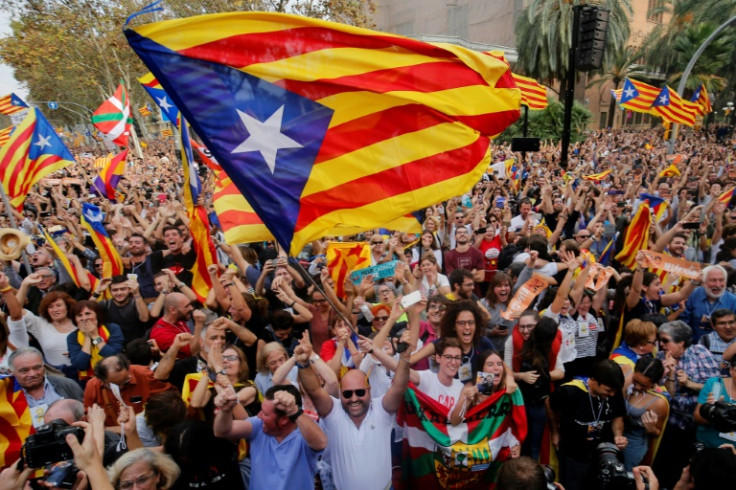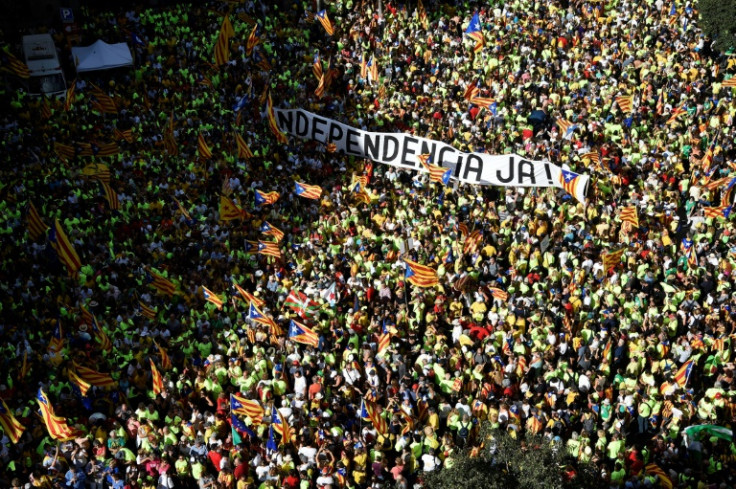Spain Poll Outcome Risks Raising Catalan Separatist Tensions

Spain's right, in power during Catalonia's failed 2017 secession bid, is trying to regain ground in the vote-rich region ahead of this month's early general election with a more conciliatory tone.
But a return to power for the conservative Popular Party (PP), which is leading in the polls, risks reigniting separatist tensions -- especially if the party needs the support of far-right Vox to govern.
PP leader Alberto Nunez Feijoo has visited Catalonia multiple times before the July 23 vote and has vowed to be the head of government of "all Catalans".
The northeastern region, one of Spain's richest whose capital is Barcelona, accounts for 48 seats in the country's 350-seat parliament.
The PP, which adopted a hard line against Catalonia's separatist push, held only two of these 48 seats in the outgoing assembly and has room to grow in the region.
Feijoo vowed during an interview published in daily newspaper El Mundo on July 2 that if he becomes prime minister, he will tell the separatists still in power in Catalonia that he is "available to talk".
The tone contrasts with that of former PP prime minister Mariano Rajoy who was in power in 2017 when the Catalan government pushed ahead with a banned independence referendum, and then issued a short-lived independence declaration.
Rajoy responded by abolishing Catalan autonomy, while the region's leaders either fled abroad or were arrested and later sentenced to lengthy jail terms.
It was one of Spain's worst political crises since the country returned to democracy following the death of longtime dictator Francisco Franco in 1975.
Socialist Prime Minister Pedro Sanchez, who came to power less than a year later, has repeated on the campaign trail that he "quelled the conflict" by taking "risky decisions".
His government in 2021 pardoned the jailed Catalan separatists behind the failed independence bid, a concession seen as unacceptable by the right which sees itself as the defender of Spanish unity.
"Feijoo learned the lessons of the management of the conflict by Mariano Rajoy," said Ana Sofia Cardenal, a politics professor at the Open University of Catalonia.
"He will try to calm spirits down with words" even if he will not significantly change the PP's policy on Catalan separatism, she added.
Feijoo has vowed to pass a law if he comes to power to punish the staging of an independence referendum and to re-establish the crime of sedition which was used to sentence the Catalan leaders.
Sanchez's government removed the crime of sedition from the penal code as an olive branch to the Catalans after the disputed referendum.
Vox takes an even harder line -- it has demanded that Catalan separatist parties be criminalised and the re-centralisation of power to Madrid.
Founded in 2013 by disgruntled former PP members, Vox's popularity soared thanks to its fierce opposition to the failed Catalan separatist bid. It was the third-largest party in the outgoing parliament.
"Faced with this reactionary wave, Catalonia will be the bastion of the defence of rights and freedoms," Pere Aragones, a moderate separatist who heads Catalonia's regional government, said last week.
He has urged Catalans to "mobilise" against the right.
A recent poll showed 42 percent of Catalans back independence while 52 percent are against.
If a PP government for example curbs the use of the Catalan language in schools in Catalonia, "it could morally inflate the independence movement," said Ernesto Pascual, a political science professor at the Autonomous University of Catalonia.
"We could return to a situation like that of a few years ago," he added.


© Copyright AFP 2024. All rights reserved.





















